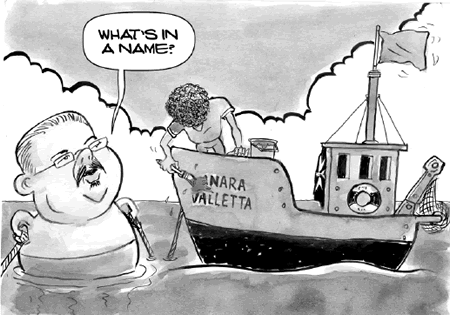
| NEWS | Sunday, 1 June 2008 No more fishy business  Two weeks ago, Transport Minister Austin Gatt launched an inquiry into what appears to have been the illegal re-registration of two fishing boats in the Grand Harbour, after the matter was referred to the European Commission by Greenpeace International and the World Wildlife Fund. The issue is complex, and involves an apparent attempt to circumvent international fishing regulations by Maltese firm Azzopardi Fisheries Ltd: two of whose boats are currently impounded in the Libyan port of Al Khums, and another two detained in the Valletta harbour. It seems that AJD Tuna Ltd, a subsidiary of Azzopardi Fisheries, owned two Libyan-flagged purse-seiner fishing boats which were licensed to fish for bluefin tuna by ICCAT, the international tuna fishing authority. Swapping identities with other (unlicensed) vessels would have enabled the firm to sidestep internationally established quotas for bluefin tuna: a fish considered to be in imminent danger of extinction. The Transport Ministry is to be commended for taking such prompt action, but it is nonetheless significant that the inquiry was ordered only after the matter had already reached the ears of the European Commissioner for Fisheries, Joe Borg. This in turn raises a number of uncomfortable questions, among them: would the inquiry ever have seen the light of day, were it not for the pressure from the European Union? And would there have been any pressure at all, had Malta not been a member state to begin with? Evidence collated by the two international wildlife conservation groups strongly suggests that the two vessels currently impounded in Libya had sailed freely in and out of Malta’s harbours in April and May, despite a number of glaring irregularities (for instance, that their Bolivian flag did not match the same vessels’ Turkish registration numbers). Is it possible that Greenpeace and WWF would notice irregularities that somehow escaped the attention of the Valletta port authorities? It seems unlikely, and only two other explanations arise: either that the port authorities were extremely negligent in giving clearance to the vessels; or that they were somehow privy to the goings-on. Apart from the Valletta port authorities, we are also owed an explanation by the Malta Maritime Authority, which somehow granted Maltese registration to two vessels which would be impounded that same day, after reflagging a second time and attempting to leave the harbour under a false Bolivian identity. This unsavoury incident has unfortunately cast a shadow over the integrity of the Maltese flag once more, at a time when the inquiry into the Erika disaster in 2001, which had tarnished our reputation so badly, had ultimately exonerated Malta of all blame. Clearly, the MMA has a lot to answer for, and no doubt these and other issues will be uncovered by the ongoing inquiry. But it seems that the focus of the investigations has to date been concentrated exclusively on the alleged involvement of the above Maltese authorities. So far, the owners of the four vessels themselves have not been investigated: neither by the Transport Authority, nor by the Ministry for Rural Affairs and Agriculture... nor, for that matter, by the police. To be fair, from enquiries made by this newspaper it transpires that the Director-General of Fisheries had requested the registrar of shipping to not recognise the suspect boats as fishing vessels. The letter to this effect was dated 16 May: three days before the official inquiry was launched. But that is as far as the matter went. Azzopardi Fisheries remain licensed to operate its tuna penning ranches, despite the serious allegations raised by Greenpeace International and WWF regarding the way the bluefin tuna held therein are actually being caught. One can only wonder how such serious allegations can be made against a local enterprise by two leading international conservation agencies, without so much as a criminal investigation into the entity under suspicion. Either way, the events of the past two weeks have clearly illustrated that the days of cowboy behaviour, in this and other industries, are now firmly behind us. As in the recent case against Malta over spring hunting, we are slowly coming round to understanding that EU membership in 2003 involved more than just fancy firework displays and generous funding. It also involves finding oneself under constant scrutiny by international institutions, which generally take a dim view of the laissez-faire attitude to which we have so far been accustomed. From this perspective, “fishy business” of the kind described above can no longer be accepted as “business as usual”. The state of play has changed, and let us be honest: thank goodness for that. Any comments? |
MaltaToday News |
Managing editor Saviour Balzan | Tel. ++356 21382741 | Fax: ++356 21385075 | Email